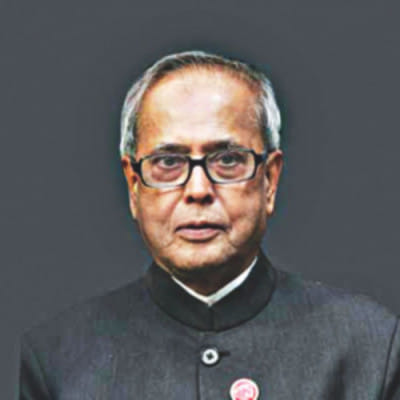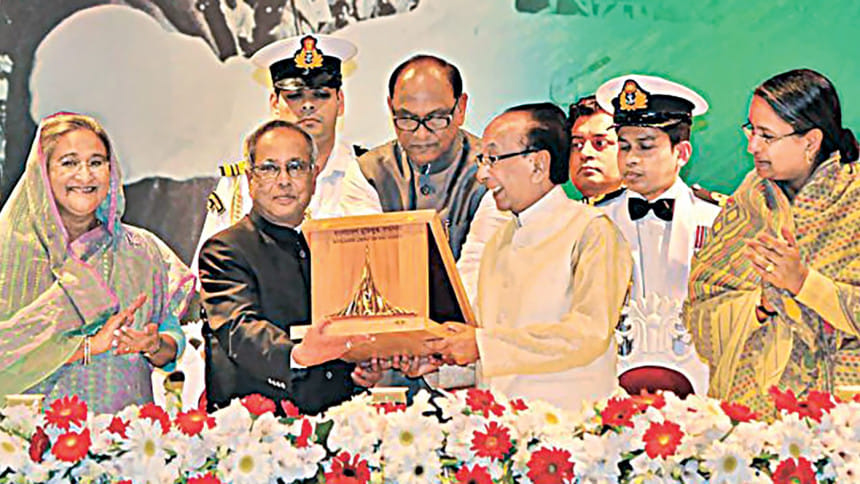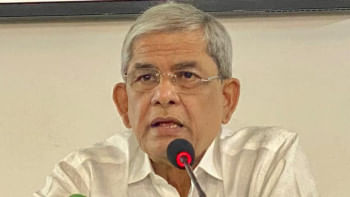A champion of our liberation no more

Former Indian President Pranab Mukherjee, a dear friend of Bangladesh, is no more.
A scholar and a towering statesman loved and respected by everyone irrespective of political affiliation, the first Bangalee Indian president died at the Army Research and Referral Hospital in Delhi Cantonment yesterday. He was 84.
He had battled various ailments for the last 20 days. He was admitted on August 10, and had been in a coma and on ventilator support since.
For Bangladesh he was more than just a statesman. Pranab Mukherjee was one of the true selfless friends and his role during the Liberation War in 1971 was the biggest statement of someone who always fought for humanity and against oppression.
He was the first foreign national who proposed recognition of the Bangladesh government in exile.
It was on June 15, 1971 during the budget session when he initiated a discussion on the floor of the Rajya Sabha, suggesting that India accord diplomatic recognition to the Government of Bangladesh in exile in Mujibnagar.
It will be probably fitting to reflect on, in his own words, how he rallied behind the oppressed people of Bangladesh in those turbulent days.
"When a member sought my suggestion on how to tackle the problem, I responded by saying: 'I am talking of a political solution which means categorically recognising the sovereign democratic Government of Bangladesh. Political solution means giving material help to the democratic, sovereign Government of Bangladesh…' I reminded the House of the many instances in world history when intervention on similar grounds had taken place," Pranab Mukharjee wrote in his book "The Dramatic Decade: The Indira Gandhi Years".
This particular statement is in the chapter titled "Muktijuddho: The Making of Bangladesh".
Pranab Mukherjee made a brief visit in March 2013.
Then Bangladesh President Zillur Rahman conferred the Bangladesh Liberation War Honour on Mukherjee at a special ceremony at Bangabhaban on the evening of March 4.
"As I stand here tonight, I am filled with memories of the events of 1971. I was 36 years old and an MP when the people of Bangladesh engaged themselves in their liberation struggle," the former Indian president told BSS at that time.
He also said that he had the privilege to initiate a discussion at Rajya Sabha when he suggested that India should accord recognition to the Bangladesh government in exile.

"Your support towards our Liberation War in 1971 was for the cause of humanity and justice... your support gave us courage and motivation," President Zillur Rahman said after handing over a crest of the award to his Indian counterpart.
He leaves behind his son Abhijit and daughter Sharmistha who is the head of the opposition Congress party's women wing. Pranab's wife for 58 years Suvra Mukherjee, who was born in Bangladesh's Narail and spent her initial years there before shifting to Kolkata, died in 2015.
His Journey in politics
Sitting on the verandah of his home in New Delhi in the early 1970s, a young Indian lawmaker saw horses from the Rashtrapati Bhavan gallop past. He jokingly told his sister that he would like to be a presidential horse in his next life. An indulgent Annapurna Banerjee, older to the lawmaker by a decade, had predicted that he would be the president one day.
When he did occupy India's highest constitutional office as the 13th president of India on July 25, 2012, becoming the first Bangalee to do so, he could not but recall during a TV interview what Annapurna had told him. He served till 2017.
In half a century in politics he donned several roles -- as a Congress party politician rising from the ranks, cabinet minister, a trouble-shooter for the party-led government and above all a statesman and a man for all seasons.
But behind all the accolades (Bharat Ratna, India's highest civilian award and epithets like elder statesman) for Pranab is his realisation that in the final analysis, he was a Bangalee to the core. "Aami Bangalee chilaam, aachi o thaakbo (I was a Bangalee, am one and will remain so)," he once said at a felicitation function in Kolkata some years ago.
Born in Mirati village in Birbhum district of West Bengal to freedom fighters Kamada Kinkar Mukherjee and Rajlakshmi on December 11, 1935, it was Mukherjee's search for his quintessentially Bangalee roots that made him a key figure in shaping India's Bangladesh policy since the 1970s.
Pranab's political journey started when Indira Gandhi spotted him during a by-election campaign in Midnapore in West Bengal where he was former Defence Minister V K Krishna Menon's poll agent.
Impressed with his political acumen, Indira inducted Pranab into the Congress central leadership and he began his parliamentary journey through the Rajya Sabha in 1969.
He became India's youngest Finance Minister in 1982 at the age of 47. From 2004, he went on to head three crucial ministries -- external affairs, defence and finance. He will also go down in history as the only non-prime minister who was the leader of the Lok Sabha for eight years.
A man of unparalleled experience in governance with the rare distinction of having served at different times as foreign, defence, commerce and finance minister, Pranab was elected to Rajya Sabha five times from 1969 and twice to Lok Sabha)from 2004. He was a member of the Congress Working Committee, the highest policy making body of the party, for 23 years.
The many awards and honours conferred on him include India's second highest civilian award, Padma Vibhusan in 2008, the Best Parliamentarian Award in 1997 and Best Administrator in India Award in 2011.
A few months before Pranab stepped down as president, he was asked what he would do. "I will melt into the masses," was his prompt response.
Tribute from president and PM
President Abdul Hamid and Prime Minister Sheikh Hasina expressed deep shock at the death of former Mukherjee.
The president said Pranab Mukherjee was a true friend of Bangladesh.
Prime Minister Sheikh Hasina expressed deep shock and sorrow at his death, calling him a "true friend" of Bangladesh and guardian-like figure to her family.
"The news of Mr Pranab Mukherjee's demise deeply saddened her. . . she became emotional and nostalgic as she reminisced her many memories with him," PM's Press Secretary Ihsanul Karim told BSS.
Sheikh Hasina, he said, also described Mukherjee as Bangladesh's "true friend" and recalled his "outstanding and unforgettable" contributions to the country's 1971 Liberation War as a politician and real well-wisher.

 For all latest news, follow The Daily Star's Google News channel.
For all latest news, follow The Daily Star's Google News channel. 



Comments